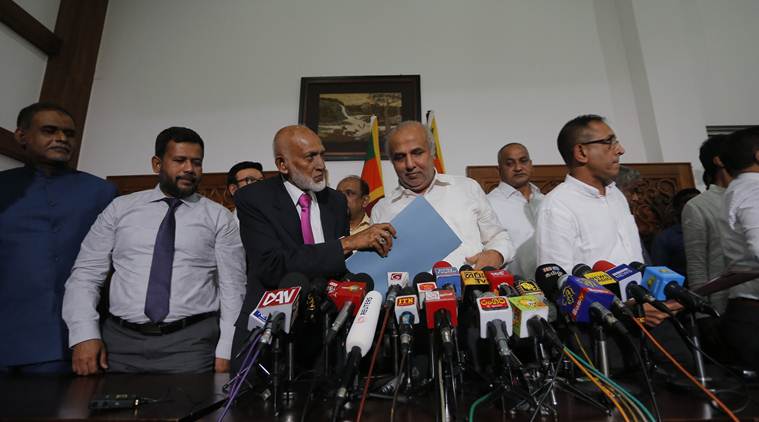
Written by Dharisha Bastians and Mujib Mashal
All nine Muslim ministers in Sri Lanka’s government and two Muslim provincial governors resigned on Monday as the fragile, Buddhist-majority country grappled further with the communal backlash of the Easter Sunday bombings that killed as many as 250 people.
The resignations were in response to a hunger strike by an influential Buddhist monk, Athuraliye Rathana, who said he would fast to death unless the country’s president removed three senior Muslim officials — the two provincial governors and one of the ministers — that he accuses of having ties to the suicide bombers who targeted churches and hotels.
The eight ministers not targeted by Rathana announced their resignations in what appeared to be an act of solidarity with the three officials accused by the monk, who also serves as a member of parliament and an adviser to the president, Maithripala Sirisena.
Rathana’s 4-day-old hunger strike, which he abandoned after the resignations, were supported by demonstrations in the capital, Colombo, as well as the central hills region of Kandy.
At a packed news conference Monday evening shortly before they broke their Ramadan fast, the nine ministers said they were resigning to ease the turmoil. The Muslim population has been “terrified over the past two days,” said one, Rauff Hakeem, minister of urban development, water supply and drainage.
“We urge the government to expedite any inquiries so that we will be vindicated from these allegations. If any of us are found guilty, they should be punished,” said Hakeem, who also leads the largest Muslim party in Sri Lanka.
“Our people fear a blood bath,” he said.
Responsibility for the bombings in April, the worst violence in Sri Lanka since the country’s long civil war ended in 2009, was claimed by the Islamic State. Since the attack, the country’s Muslim population, about 10% of the total, has increasingly faced suspicion and violence. Last month, mobs attacked Muslim homes and shops, forcing the government to declare a state of emergency and impose a curfew, since ended.
The support of Muslim voters and ethnic minority Tamils was decisive in the election victory of Sirisena in 2014 over the former strongman, Mahinda Rajapaksa.
Despite their resignations, the four Cabinet ministers and five junior ministers said they would continue to support the fragile government so it does not collapse to the opposition led by Rajapaksa.
At the bedside in support of the hunger-striker was Galagoda Aththe Gnanasara, another hard-line monk who has been accused of inciting violence against Muslims.
On Sunday, Gnanasara, who leads the Buddhist Power Force movement and whose six-year sentence for contempt of court was recently annulled by a presidential pardon, gave an ultimatum. There would be “a circus” nationwide, he said, unless the three Muslim politicians were removed from office by noon Monday.
The police have not pointed to any evidence linking the three officials to the attacks.
The resignations drew condemnation across Sri Lanka, with senior politicians expressing outrage on the communal nature of the demands.
“A shameful day for our beloved Sri Lanka,” said Mangala Samaraweera, the minister of finance.
Abraham Sumanthiran, a senior lawmaker from the Tamil alliance, said it was “unfortunate that Muslim ministers succumbed to pressure from racists.”
“Yesterday us, today you, tomorrow a new ‘other,”’ Sumanthiran said.
There was fear that the resignations could set a new precedent in Sri Lanka, which has already seen a rise of Buddhist nationalism. The episode was likely to further erode Sri Lanka’s political instability.
“Buddhism having the foremost place in Sri Lanka seems to be Buddhism having the foremost place in terms of a veto on who can be in government and who cannot be in government,” said Paikiasothy Saravanamuttu, the executive director for the Colombo-based Centre for Policy Alternatives.